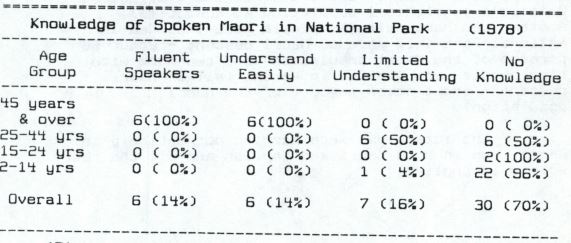-
Ngā Karere me Ngā Rauemi
News and Resources
Ngā Karere me Ngā Rauemi
News and Resources
-
Te Rangaihi Reo Māori
The Movement
Te Rangaihi Reo Māori
The Movement
-
Te Pae Kōrero
Our Community
Te Pae Kōrero
Our Community
-
Huihuinga
Events
Huihuinga
Events
-
Ngā Ara Ako
Learning Pathways
Ngā Ara Ako
Learning Pathways
-
SearchSearch
Search
Search

Although only a few people included in the National Park survey were able to speak and understand Maori well, the survival of the language was obviously very important to many people in these districts. A number of people felt that not only was it important for themselves to learn to speak Maori, it was also important for their children and grandchildren to learn. To this end, there was much support for the teaching of Maori in schools and some people had already started teaching their mokopuna themselves.
Hopefully these positive feelings towards the Maori language will not disappear so that more young people can be encouraged to become aware of the importance of the language and of the opportunities for learning it and take advantage of them.
Manawatū-Whanganui | Ruapehu | 1970-75 | 5% of Māori children can speak te reo. (1970-75) | Story is by tangata whenua
















Comments